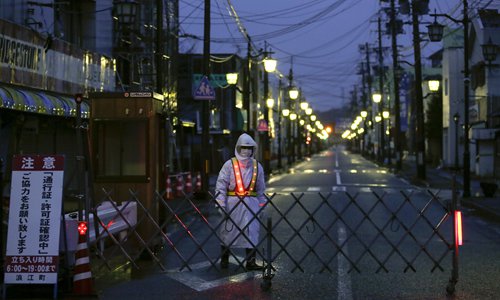World worries about release of Fukushima nuclear water
By Xu Keyue Source: Global Times Published: 2020/10/18 21:33:40
Neighboring countries oppose 'irresponsible' plan

A security guard stands on an empty main street at dusk in Namie, north of Fukushima Daiichi Nuclear Power Plant, Fukushima Prefecture, Japan on March 9, 2016. Photo: IC
The world public, especially those in Japan's neighbors such as China and South Korea, have expressed deep concerns over environmental pollution and human health, and opposition to the Japanese government's plan to dump radioactive water from the disabled Fukushima nuclear plant into the ocean.
Analysts said that Japan should think twice before making the decision as the move would have disastrous consequences for the marine environment and human health, which could lead to criticism by related international organizations, countermeasures by affected countries including cessation of imports of Japanese seafood, and harm to the country's image.
Japanese media said that the country's government will hold a related cabinet meeting as early as this month to make the final decision on the plan to release more than 1 million tons of radioactive water from the Fukushima Daiichi nuclear power plant into the Pacific Ocean after reducing the level of radioactivity.
The plan has not gotten much rolling coverage in Japan, but there are still many Japanese netizens expressing their disagreement. According to a poll on Yahoo Japan, 41.5 percent of the 31,035 respondents disagreed with the plan.
Local fishermen in Fukushima publicly announced their opposition, saying the plan will undo years of work rebuilding their industry's reputation since the plant was wrecked by a huge tsunami in March 2011.
The public of South Korea has repeatedly voiced concern, claiming that discharging the water represents a "grave threat" to the marine environment.
A South Korean Foreign Ministry official told reporters that a meeting of related ministries regarding this issue was elevated to vice-ministerial status last month to step up the response to Japan's move, reported South Korea's KBS News on Friday. The official said the government will continue to closely monitor Tokyo's activities and take measures based on cooperation with the international community.
Japan's plan also sparked outrage among Chinese netizens, many of whom criticized Japan's practice, saying it is throwing its responsibility onto the world to share.
Sun Yuliang, a nuclear expert at Tsinghua University in Beijing, told the Global Times on Sunday that whether to dump the waste water should depend on an authoritative scientific assessment to determine whether the processed radioactive water meets international standards for release.
Sun called on the Japanese government to invite professional teams from related international organizations such as the International Atomic Energy Agency to conduct a complete field investigation.
Liu Junhong, a research fellow at the China Institutes of Contemporary International Relations, urged Japan to further communicate with the international community and share information transparently.
Liu said that the Japanese government should give priority to safeguarding public health and safety and the environment, rather than the cost of the rehabilitation work after the 2011 Fukushima disaster.
Liu noted that the seas in Asia are mostly connected and many of them are semi-closed, so that the contaminants from the Fukushima water could subside and then rise, which would severely affect the local marine and coastal environment and the health of people nearby.
Therefore, Japan's neighboring countries including China and South Korea would be the first to react to the plan, Liu said.
He noted that if the Japanese government releases the water, these countries are likely to stop imports of seafood from Japan, and foreigners could be reluctant to visit the country and enjoy its food, which would harm Japan's economy.
Other analysts noted that the plan goes against Japan's long-established image of being friendly to the marine environment.
Another expert on nuclear safety, who requested anonymity, said that the issues is not only one of Japan's own business but also relates to the interests of the global community, so countries and related organizations in the international community should cooperate and assist Japan to deal with the contamination.
The Daiichi Nuclear Power Plant in Fukushima went into meltdown and released radioactive material in the aftermath of a tsunami in March 2011.
The disaster cast doubts over the safety of nuclear power worldwide, leading China to launch a campaign to review and upgrade the safety systems of all its nuclear power stations.
Posted in: DIPLOMACY